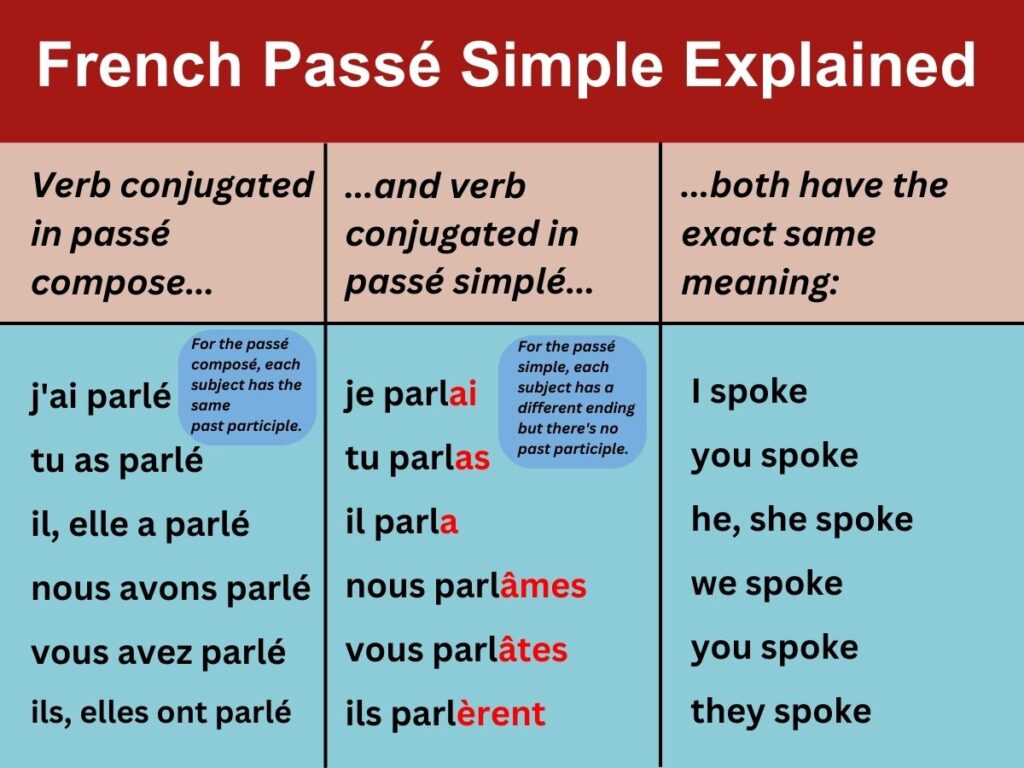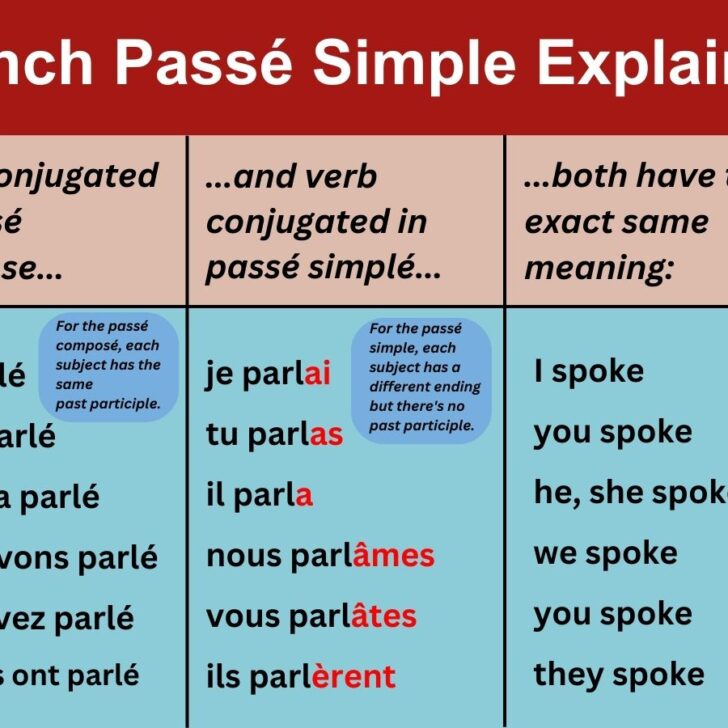What is the French passé simple?
The French passé simple is a past tense that equates grammatically to the passé composé. Yet, it’s generally overlooked and not learned. This post demystifies the passé simple for students of all levels.

What is the French passé simple?
The passé simple (simple past or past definite) is a literary past tense used in formal writing, such as history and literature. It is not used in everyday conversational French. It is used in writing where the passé compose would be used in spoken French. While it’s a good idea to recognize the passé simple, it’s not so important to memorize.
How to conjugate the passé simple
Unlike the passé composé, the passé simple does not require an auxiliary verb.
The passé simple is formed with one single word. For example, je parlai translates to “I spoke” and is grammatically equivalent to j’ai parlé (I spoke in the passé composé).
The absence of an auxiliary verb also applies to reflexive verbs. For example, je me levai in the passé simple means “I go up” and is grammatically equivalent to je me suis levé in the passé composé.
Regular -er verbs take the following endings: -ai, -as, -a, -âmes, -âtes and -èrent.
Regular -ir and -re verbs take the following endings: -is, -is, -it, -îmes, -îtes and -irent.
For verbs like prononcer (to pronounce), add a cedilla (ç) and for verbs like nager (to swim) and an extra -e- for all forms except ils.
Passé simple conjugation for regular verbs
| PARLER TO SPEAK | |
| je parlai tu parlas il parla | nous parlâmes vous parlâtes ils parlèrent |
| FINIR TO FINISH | |
| je finis tu finis il finit | nous finîmes vous finîtes ils finirent |
| VENDRE - TO SELL | |
| je vendis tu vendis il vendit | nous vendîmes vous vendîtes ils vendirent |
| PRONONCER TO PRONOUNCE | |
| je prononçai tu prononças il prononça | nous prononçâmes vous prononçâtes ils prononcèrent |
| NAGER - TO SWIM | |
| je nageai tu nageas il nagea | nous nageâmes vous nageâtes ils nagèrent |
Passé simple conjugation for irregular verb savoir, être, faire and aller
The passé simple endings for avoir (to have), être (to be) and faire (to make, to do) are irregular. Aller (to go) takes the endings of regular -er verbs in the passe simplé.
| ÊTRE TO BE | |
| je fus tu fus il fut | nous fûmes vous fûtes ils furent |
| AVOIR TO HAVE | |
| j'eus tu eus il eut | nous eûmes vous eûtes ils eurent |
| FAIRE TO MAKE, DO | |
| je fis tu fis il fit | nous fîmes vous fîtes ils firent |
| ALLER TO GO | |
| j'allai tu allas il alla | nous allâmes vous allâtes ils allèrent |
Passe simplé conjugations for irregular verbs
The following is a list of irregular verbs in the passé simple. We’ve highligted the third-person singular (il/elle) and third-person plural (ils/elles) forms as they appear frequently in literature.
| VERB | ENGLISH | IL/ELLE | ILS/ELLES |
| acquérir | to acquire, get | il acquit | ils acquirent |
| appuyer | to press | il appuya | ils appuyèrent |
| s'asseoir | to sit | il s'assit | ils s'assirent |
| boire | to drink | il but | ils burent |
| conduire | to drive | il conduisit | ils conduisirent |
| connaître | to know | il connut | ils connurent |
| courir | to run | il courut | ils coururent |
| croire | to believe | il crut | ils crurent |
| cueillir | to gather, pick | il cueillit | ils cueillirent |
| devoir | must | il dut | ils durent |
| dire | to say | il dit | ils dirent |
| dormir | to sleep | il dormit | ils écrivirent |
| écrire | to write | il écrivit | ils écrivirent |
| envoyer | to send | il envoya | ils envoyèrent |
| falloir | to be necessary | il fallut | |
| fuir | to flee | il fuit | ils fuirent |
| lire | to read | il lut | ils lurent |
| mettre | to put | il mit | ils mirent |
| mourir | to die | il mourut | ils moururent |
| naître | to be born | il naquit | ils naquirent |
| ouvrir | to open | il ouvrit | ils ouvrirent |
| peindre | to paint | il peignit | ils peignirent |
| plaire | to please | il plut | ils plurent |
| pleuvoir | to rain | il plut | |
| pouvoir | to be able, can | il put | ils purent |
| prendre | to take | il prit | ils prirent |
| recevoir | to receive | il reçut | ils reçurent |
| résoudre | to resolve | il résolut | ils résolurent |
| rire | to laugh | il rit | ils rirent |
| rompre | to break | il rompit | ils rompirent |
| savoir | to know | il sut | ils surent |
| sortir | to go out | il sortit | ils sortirent |
| suivre | to follow | il suivit | ils suivirent |
| se taire | to be quiet | il se tut | ils se turent |
| tenir | to hold | il tint | ils tinrent |
| vaincre | to win, conquer | il vainquit | ils vainquirent |
| valoir | to be worth, deserve, merit | il valut | ils valurent |
| venir | to come | il vint | ils vinrent |
| vivre | to live | il vécut | ils vécurent |
| voir | to see | il vit | ils virent |
| vouloir | to want, wish | il voulut | ils voulurent |

